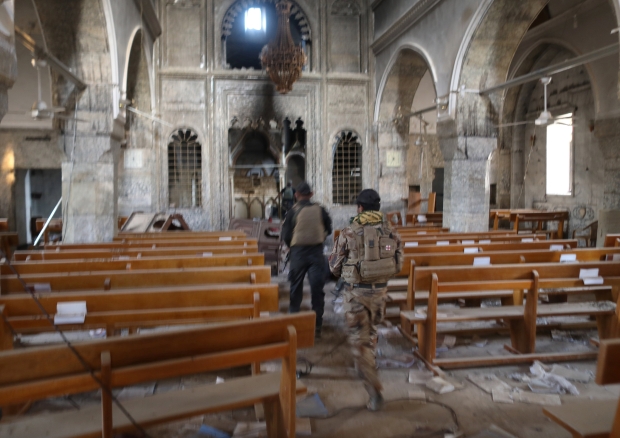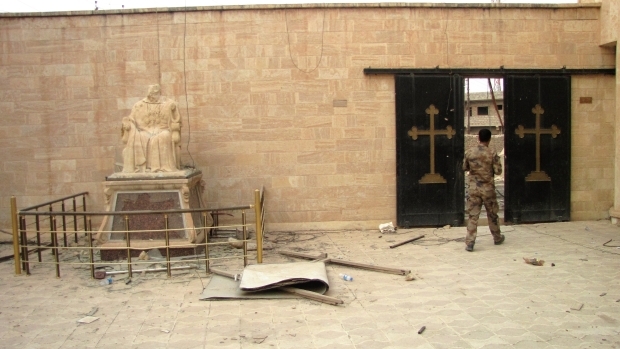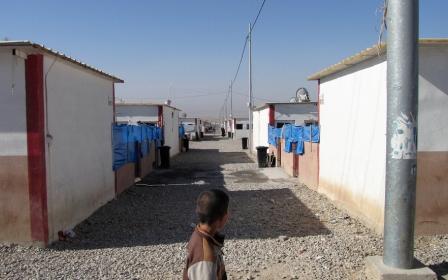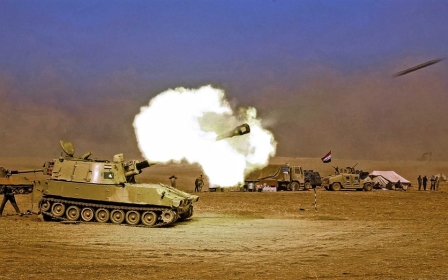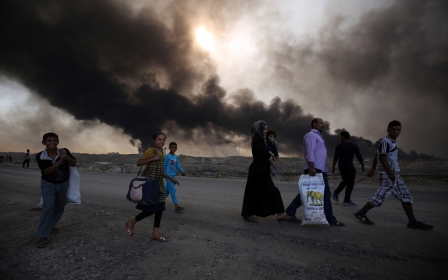Where angels feared to tread: Inside the ruins of Iraq's Christian heritage
BARTELLA, Iraq - A member of the Iraqi army scrambles up the stairs of a heavily damaged orthodox church in this old Christian town. He tugs at a rope, causing the bells above to ring out – bells which had remained dormant for the two years and three months of the Islamic State's reign.
Bartella, a small Christian town that is 2,000 years old, holds a special place in the hearts of most Middle Eastern Christians. It suffered greatly under the grip of IS, whose treatment of Christians has been widely documented - enslavement, ethnic cleansing and murder among their crimes and atrocities.
It is once again under the control of a government that promises religious freedoms. Christian militias were involved in its recapture, as were Shia and Kurdish forces.
But to believe with any confidence that Bartella and its surrounding villages have been fully liberated would be premature to say the least, and potentially deadly.
As they entered the church's vestibule, the Iraqi soldier's comrades yelled for everyone to duck, as bullets whistled and cracked above their heads.
It seems Islamic State militants refuse to acknowledge their defeat. Most of the IS contingent had pulled out, but snipers and suicide squads are often left behind to prowl the battlefields. These men clearly had no intention of going back.
The countryside east of Mosul, and certainly the town of Bartella as well, are riddled with IS tunnels - where militants can seemingly emerge at any time to deal death.
Over the course of its nearly 28-month reign, IS managed to thoroughly ransack Bartella. A large portion of the Christian town has been mined. The Iraqi soldiers fear that, despite an intensive clean-up, a number of explosive devices may have remained in place.
The soldiers, however, seemed unconcerned about the incoming fire, or the potential for booby traps. Instead, they rushed in where angels had for months feared to tread - taking photographs, dance and ringing the bells in euphoria.
They had the look of men who had been through so much worse. For at least some of the younger ones, the war is virtually the only thing life has had to offer so far.
Desecrated church
The orthodox church in Bartella was heavily damaged during the reign of IS.
Some of its walls and eaves were burned, and the church tower and main gate wrecked. A statue sits on a plinth with most of its head removed - due to IS rulings on idolatry or during battle, it is difficult to say.
The church's interior is dusty and scarred, its once-ornate windows smashed and its walls desecrated with IS graffiti. The rooms have been stripped of all their worth.
When Father John, a grey-haired orthodox priest, returned to his home town last Sunday morning, accompanied by Iraqi soldiers and some of the faithful, he was quick to notice how many things were missing, especially books and documents.
Before leaving, the father took with him most of what had been left behind - just in case. In one of his rooms, he had somehow overlooked a painting of the Last Supper. An Iraqi army recruit picked it up and moved it somewhere safe.
The militants have also desecrated the local cemetery. Most of the antique and medieval artefacts were destroyed. From the look of things, the oldest houses got the worst of it.
Three days after its official liberation, Bartella looked like some Normandy village on a grey and dusty summer day in 1944. Rubble lay wherever people dared to walk.
And the church is far from a haven of peace. A mere 200m from the church, Iraqi soldiers set up heavy artillery to pummel nearby IS positions. Officers yelled, smoke billowed and planes roared overhead.
“The battle was hard. The dangers are still everywhere. We are still fighting in nearby town of Hamdaniya. Booby-traps are everywhere. Suicide attacks can happen at any time,” said Ahmed Buhari, an officer in the elite Golden Brigade, who fought and defeated IS in Ramadi and Fallujah.
Bartella has mostly been stripped of civilians. Most residents had long fled the city, and so far, only about a dozen have returned. None were to be found inside the town, but dozens of civilians were seen fleeing the front line in trucks, crammed with all kinds of possessions, heading for Erbil and refugee camps.
And not only because of what you can see in Bartella.
In the wider surrounding area, the devastation is even worse. Coalition bombing, Kurdish artillery and the "defensive" action of the Islamic State have razed a large chunk of the eastern front to the ground.
What used to be exceptionally fertile fields on the Nineveh plains have all turned to dust, untilled by human hand for at least two years. The roads are riddled with bomb craters. The factories have been turned to little more than dust and rubble. Even the birds have flown away.
Here in this place, not only the past is dying. Here – in present tense – the future is dying as well.
Middle East Eye propose une couverture et une analyse indépendantes et incomparables du Moyen-Orient, de l’Afrique du Nord et d’autres régions du monde. Pour en savoir plus sur la reprise de ce contenu et les frais qui s’appliquent, veuillez remplir ce formulaire [en anglais]. Pour en savoir plus sur MEE, cliquez ici [en anglais].


